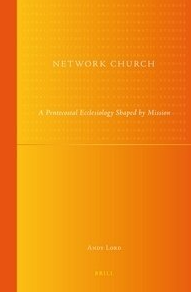Reflections on Andy Lord: Network Church
I believe highly relevant to some current issues dealing with how the Christian tradition engages or might engage contemporary cultural artefacts (such as film and art) or themes expressed via these artefacts, is Andy Lord’s reflection on how we might more deeply inform Pentecostal assumptions about the church in mission with the Missio Dei concept (mission of God: God’s mission towards and within creation) (Lord, Network Church: A Pentecostal Ecclesiology Shaped by Mission [Brill, 2012], pp. 29-32).

More specifically, I think Lord’s reflection provides some guidance on listening to themes of both redemptive yearnings and redemptive themes sometimes conveyed through cultural media.
After briefly noting how classical dispensationalism oftentimes cripples motive towards holistic mission and social concern, Lord discusses the holistic vision of God’s mission towards the transformation of all creation, of which the signs of His coming kingdom provide a foretaste. Lord thus writes, “Through mission [e.g., God’s mission] we see God at work both building on the good that is seen in the created order, and also challenging and prophetically overcoming the evil” (p. 30).
Lord transitions more specifically to the relation of the church in mission to the mission of God: “This mission of God, missio Dei, is worked out through the church in the wider world and also directly in the world outside the church. Thus there is a two-fold aspect to God’s mission” (p. 30). Lord then insightfully argues, “I have suggested that in mission we can see God at work in two different Spirit movements. Firstly, there is a movement that centres on the church and sees it sent out into the world. This is the common pentecostal and evangelical approach to mission that sees the church carrying the gospel out to all nations before Jesus returns. Yet, as I will later argue in Chapter 7, there is a greater pentecostal recognition of the Spirit at work in the world outside the church. In mission, we can see the Spirit also at work in all creation, moving people in the direction of Christ in holistic ways. This kind of mission is often represented by those seeking God’s liberating work in the world. Both of these movements of the Spirit are important, and both represent ways in which the kingdom over which Christ rules is made present in the church and wider world.” (pp. 30-31).
Lord makes this observation: “The church is called by Christ to enable the kingdom, but often has to catch up with Christ at work bringing in His kingdom ahead of it” (p. 31).
Lord’s reflections resonate with themes that can be often found in contemporary missional church literature, that challenges us towards recognising the broader concerns of God’s mission (missio dei). Such literature commonly challenges us to thus “listen” to our cultural context.” Yet this is very different from the older “seeker service” model that focuses on “contextualising” to our cultural context. In missional thinking, the greater nuance lies rather on listening to whatever redemptive themes or redemptive yearnings might be emerging from within our broader setting (for example, see Aland J. Roxburgh and M. Scott Boren, Introducing the Missional Church [BakerBooks, 2009], pp. 69f, 84-86f).
Is it possible that in our day, one of the great “redemptive yearnings” currently voiced is increasing concern for the global environment; hence, creation care? When we appreciate that the mission of God is directed not only towards humanity but moreover to the saving of of all creation— then we can also appreciate how increasing concern for saving the earth’s environment, may hint towards the Spirit’s yearning from within our broader cultural context, and also the cries of redemption rising from the imago dei that still flickers in broken humanity.
Editor’s Note: Monte Rice invites you to interact with him and the PneumaReview.com community about these reflections in the comment section below.
Category: Ministry


